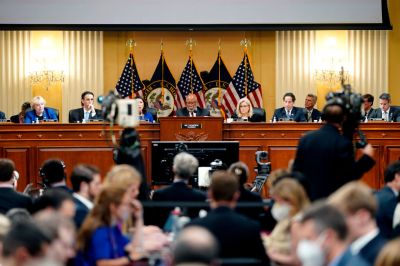The long list of former President Donald Trump’s legal woes has grown even longer in recent months. Between legal fights over his business interests or handling of classified information, it can be easy to forget that the House is investigating Trump’s role in the 2021 Capitol attack. While the January 6 committee has kept quiet recently, that could soon change.
The committee will hold a hearing on Thursday at 1 p.m—its first in 12 weeks. It was originally scheduled for September 28 but officially postponed due to Hurricane Ian. The committee interviewed Ginni Thomas, wife of Supreme Court Justice Clarence Thomas, on September 29, though it’s unclear whether her testimony will be incorporated into the hearing. She is known for her belief that the 2020 election was stolen from Trump and is well-connected in his inner circle.
Also uncertain is whether this hearing will be the last. “We don’t anticipate that it will be the last hearing,” Rep. Liz Cheney, the committee’s vice chair, said last month. But Rep. Adam Schiff said that it would be “the last hearing of this nature” and that “it’ll be potentially more sweeping than some of the other hearings.”
The House of Representatives is scheduled to be out of session until after Election Day, and the committee must publish its final report before the next Congress is sworn in on January 3.
Here’s what we learned from the eight previous hearings over the summer.
1. Trump’s aides repeatedly told him he had lost the 2020 election—but he persisted in trying to hold on to power. He had no grounds for his claims of widespread fraud, and when advisers like Attorney General Bill Barr, campaign manager Bill Stepien, and White House Counsel Pat Cipollone told him otherwise, he ignored them and turned to more conspiratorial voices such as Rudy Giuliani and Sidney Powell.
Trump bought into law professor John Eastman’s theories that Vice President Mike Pence could reject or delay the certification of electoral votes from states Trump lost. The president pressured Pence to do so in what may have been a violation of federal law.
Cheney has referred to a ruling by U.S. District Court Judge David O. Carter that Trump and Eastman “more likely than not” broke federal law. She has also indicated that it would be a serious mistake for the Justice Department to decline to prosecute Trump if there is evidence that he did, in fact, commit a crime.
2. Extremist planning paved the way for MAGA spontaneity. Many rioters didn’t come to Washington, D.C., planning to storm the Capitol. Stephen Ayres, for example, testified to the committee in July that he came from Ohio for the Stop the Steal rally, then decided to march on the Capitol when Trump egged on the crowd.
But it would have been much harder for the mob to infiltrate the Capitol without the advance planning by members of the far-right Proud Boys, who scouted the area that morning and breached the security perimeter at 12:53 p.m.—17 minutes before the end of Trump’s speech.
While the crowd may have included spontaneous rioters, in Cheney’s words, “the attack on our Capitol was not a spontaneous riot.”
3. Trump knew the crowd was armed—but he riled it up anyway. Cassidy Hutchinson, a former aide to Trump’s chief of staff, Mark Meadows, testified that Trump was incensed that some of his supporters couldn’t enter the rally area due to Secret Service-manned magnetometers screening people for weapons. “I don’t f—ing care that they have weapons,” Trump allegedly said. “They’re not here to hurt me.”
In his speech, he castigated Pence for a lack of courage and urged the crowd to march to the Capitol—where he apparently assumed he would be joining them. His daughter, Ivanka, had to talk him into using the language “stay peaceful” and “remain peaceful” in tweets that afternoon—but the mob was already violent.
4. Trump chose not to act while the mob threatened Congress. “It was obvious that only President Trump could end this,” then-Senate Majority Leader Mitch McConnell said of the attack back in February 2021. That afternoon, Trump’s followers eventually acquiesced to a 4:17 p.m. Trump tweet asking them to leave—but only after wreaking havoc for more than three hours and coming dangerously close to Pence as Secret Service agents feared for their lives. All the while, Trump refused to address the nation and mused in the White House that Pence might actually deserve to be hanged.
Whether the committee’s findings will make a difference in the Justice Department’s January 6 investigation or in the minds of the public remains to be seen. But to Cheney, the fact that the investigation took place at all will have been at least a partial victory.
“Once that bipartisan commission had been rejected by my party, by the Republicans, the question became, are you going to investigate, or are you simply going to say, you know, ‘too bad, we’re gonna throw our hands up and walk away?’” she told a Dispatch Live audience in June, prior to the start of the series of hearings. “And I don’t think that there’s any way that we could have said we’re gonna throw our hands up and walk away.”






Please note that we at The Dispatch hold ourselves, our work, and our commenters to a higher standard than other places on the internet. We welcome comments that foster genuine debate or discussion—including comments critical of us or our work—but responses that include ad hominem attacks on fellow Dispatch members or are intended to stoke fear and anger may be moderated.
With your membership, you only have the ability to comment on The Morning Dispatch articles. Consider upgrading to join the conversation everywhere.